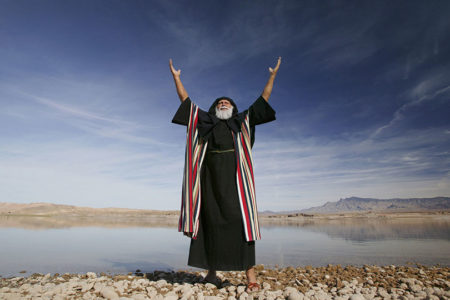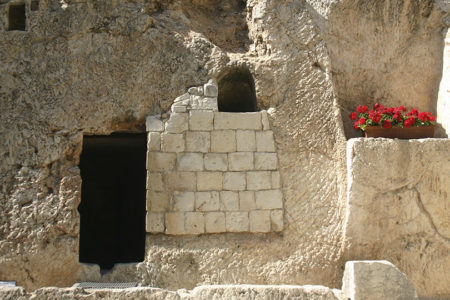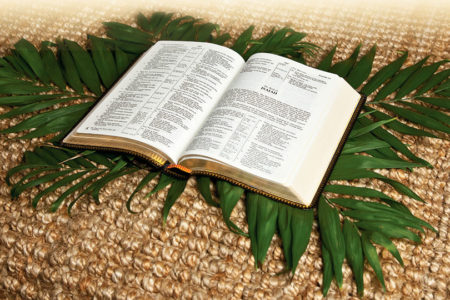Isaiah Sees Israel’s Future
Isaiah’s prophetic vision of Israel’s future was written during the reign of four kings over a span of 60 years. The prophet wrote a detailed revelation of Israel’s sinfulness, judgment, exile, and restoration and spoke extensively of Israel’s Messiah, salvation, and Kingdom blessings.
Isaiah expressed God’s love for Israel in a parabolic lyric, comparing the nation to a beloved vineyard that God created and placed on a fruitful hill. The garden was cultivated, cleared of all stones, and planted with the choicest of vines. In the vineyard was a winepress for processing the grapes and a watchtower for protection. Israel was expected to produce good grapes, symbolic of godliness. Instead, it produced wild grapes, symbolic of its idolatry, social and political injustice, and gross immorality (Isa. 5:1–7).
God reasoned with Israel to repent of its wickedness and return to Him in righteousness, whereby it would be rewarded with agricultural prosperity and national security. Israel rejected God’s request, so the Lord punished the nation and sent it into exile (1:11–20; cf. Lev. 26; Dt. 28:15–68). However, throughout Israel’s judgment and exile, the nation remained God’s chosen servant (Isa. 41:8–9; 43:20–21).
The book of Isaiah expresses God’s deep love for Israel using vivid metaphors. God is portrayed as Israel’s husband (54:5–8) and shepherd (40:11); He shows compassion for Israel like a mother for her child (49:15); He has engraved Israel’s name on the palms of His hands (v. 16); and He shows pity to the nation, eventually bringing redemption to a remnant (63:9).
The remnant that survives judgment becomes seed for the nation’s future restoration (6:12–13). Israel’s restoration and return from the Babylonian Exile is a picture of its final, future redemption and restoration to its Promised Land at the Messiah’s Second Coming.
That restoration is detailed in chapters 40 through 66, which is divided into three sections of eight chapters each (40—48; 49—57; 58—66). Two sections conclude with “There is no peace…for the wicked” (48:22; 57:21); and the last section describes the destiny of the wicked (66:24). In these chapters, God foretells Israel’s repentance and redemption and the renewal of its covenant relationship through the Messiah.
Israel’s Messiah
Israel’s relationship with its Messiah is central to the prophet’s vision of the nation’s future. In numerous passages, Isaiah identified the Messiah as the Servant of Jehovah (chaps. 42; 49). The New Testament clearly validates that Jesus Christ fulfilled Isaiah’s prophecies.
Isaiah also revealed the Messiah is a God-Man (9:6). He is virgin-born (7:14), a descendant of Jesse and King David (11:1, 10), and the Suffering Servant who gave His life to provide redemption for both Jews and Gentiles (53:1–12) through the blood of the New Covenant (49:7–8).
In chapter 54, Israel is presented as Jehovah’s barren, desolate wife who will eventually be brought into covenant renewal with Him. An urgent call goes out to Israel, inviting the nation to renew its covenant relationship with the Lord, as David did. If Israel seeks the Lord, it will find Him (55:6–13). During both His First and Second Advents, the Messiah’s ministry is both Holy Spirit-filled and directed (42:1; 61:1–2; cf. Lk. 4:18).
At the end of the Great Tribulation, a remnant of Jewish people will cry out in repentance to God, praying that He spare them from annihilation (Isa. 64:1–12). The Messiah will answer them and arrive as a conquering King in the day of vengeance to judge the city of Bozrah in Edom—a nation He greatly despises for its persecution of Israel (cf. Obad.). Then He will save the remnant of Israel, treading over its enemies as one treads grapes in a winepress. His garments are described as red because they will be splattered with the blood of Edom, where Jewish people will hide from the Antichrist’s wrath during the Great Tribulation (Isa. 63:1–6; cf. Rev. 19:13, 15).
Israel in the Millennium
Israel will be delivered from its enemies at the Messiah’s Second Coming, after which will be a golden age of peace, prosperity, and plenty. In theological terms, this is the Millennium. The word millennium means “thousand years” and refers to the 1,000-year reign of Messiah Jesus in Israel.
Isaiah revealed that Israel will be gathered and restored to the land after the Messiah’s return. Jerusalem will be rebuilt to a greater glory than it has ever known throughout its long history (Isa. 2:2; 11:11). Previously called Forsaken and Desolate, it will be renamed Hephzibah (“My delight is in her”) and Beulah (“Married”). God has promised by an oath to restore Jerusalem and set a watchman within the city as a continual reminder of His promise. A highway will be prepared for the people to return to Israel during the Millennium (62:4–7, 10).
Israel will be changed in eight ways:
- Peace will flow from Israel to the entire world (2:4; 26:12; 66:12).
- Personal and political justice will emanate from the Messiah’s righteous rule (11:3–5).
- Psychological changes will be manifest in Israel as weeping is abolished and replaced with rejoicing (30:19; 65:18–19).
- Physical changes will abound as life is prolonged (65:20), sickness abolished (33:24), infant death eliminated (65:23), and those entering the Millennium are physically healed (35:5–6).
- Protection from invading Gentile nations will not be needed (65:21–22).
- Productivity in Israel will be unprecedented (vv. 21–22), and the desert will become fertile (35:1–2).
- Prayers will be answered before being uttered or while the person is speaking (65:24).
- Creation’s plight will be completely reversed, as the curse is removed and all animals live peacefully (11:6–9; 65:25).
In the Millennial Kingdom, peace will come to the Middle East. Hostilities between Israel, Assyria, and Egypt will be replaced by friendship because of their common faith in the Messiah (19:18–25). In fact, an international highway will run from Egypt through Israel and up to Assyria (v. 23). The word highway means a causeway or raised superhighway that will be visible to all, and it will provide unrestricted access from Egypt to Assyria.
In that day Egypt will have been converted (v. 20) and speak Hebrew, the language of “Canaan” (v. 18). The Messiah will be Egypt’s Savior, and there will be an “altar” for worship and “a pillar” identifying the Egyptians as accepted by the Lord (v. 19). They will bring sacrifices and offerings and make vows to the Lord in Egypt and worship at the Millennial Temple in Jerusalem (v. 21; Zech 14:16–19).
Israel, Egypt, and Assyria will be God’s chosen people in that day: “Blessed is Egypt My people, and Assyria the work of My hands, and Israel My inheritance” (Isa. 19:25).
Israel’s Ministry
In the Millennium, Israel will be priests of the Lord and servants of God. Israel’s priestly capacity will be recognized and accepted around the world, and the priests and people of Israel will eat of the wealth of the nations (60:1–22; 61:6; cf. Zech. 8:23). In other words, Gentile nations will serve Israel and bring their wealth to build up the nation because Jehovah will have sanctified Israel and put His sanctuary in Jerusalem. What a great day of rejoicing this will be for Israel and the entire world.








Pls I just want to ask this question, are the people living in Israel today the real Israelites? if so are they the ones who went to slavery over and over in this world?? Were the true Israelites Europeans as portaged today? were they the slaves in Egypt, Babylon etc???
Hi Suzanne,
Thank you for your question. Here is a link to some articles regarding Replacement Theology:
https://israelmyglory.org/?s=replacement+theology
Blessings!
Are there any articles on “Replacement Theology”? I could not find it on line